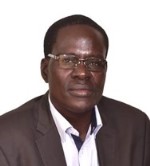Engaging with The Politics and Contestations in
Project Management Institute’s Conceptualizations
of Project and Project Management
FEATURED PAPER
Isaac Odhiambo Abuya, PhD
University of Nairobi
Nairobi, Kenya
Abstract
This seminal paper on ‘Thinking and Working Politically (TWP)’ in Projects argues that whereas the Project Management Institute’s (PMI) conceptualizations of a project as ‘a temporary endeavour undertaken to produce a unique product, service or result (PMI, 2008) and project management as ‘the application of knowledge, skills, tools, and techniques to project activities to meet the project requirements’ (PMI 2017) reinforce the technically rational paradigm, these conceptualizations are inherently political. This paper engages project managers with the politics, power, interests and contestations embedded in PMI’s definitions of project and project management. The paper contributes to the emerging and budding scholarship on Thinking and Working Politically (TWP) and argues that while the TWP paradigm has overly focused on development assistance and its potential contribution to aid (development effectiveness), the TWP is equally relevant to Project Management. Consequently, the paper extends the TWP scholarship to project management. It is posited that the journey to Thinking and Working Politically for project managers, especially those in developing and emerging country contexts and settings, begins with an honest engagement with the politics and contestations in PMI’s conceptualizations of project and project management. It is further argued that 21st Century project managers should reflect on the political implications of PMI’s definitions and should contend with the power, interests, contestations and information asymmetries embedded in the definitions. Last but not least, a case has been made for project managers to think beyond the technical rationality paradigm and integrate politically smart techniques, skills and methods in his or her project management toolkit.
Introduction
Project management has traditionally been grounded on technical rationality and has strategically or naively eschewed politics. While technical rationality has informed project decisions and has shaped the way project success is conceptualized, we argue that the success of projects is equally and importantly embedded in the way project managers ‘think and work politically’. Youker (1991) posited that power (and politics) is probably the most important topic in project management but at the same time one of the least discussed subjects. According to Youker (1991) power, from an engineering perspective is defined as the ability to do work while from a social sense, power is the ability to get others to do the work (or actions) you want regardless of their desires. When we think of all the project managers who have responsibility without authority, who must elicit support by influence and not by command authority, then, according to Youker we can see why power(politics) is the most important topic in project management. Youker’s papers raised the telltale sign for project managers to think and work politically.
We argue that the Project Management Institute’s conceptualizations of a project as ‘a temporary endeavour undertaken to produce a unique product, service, or result’ (PMI 2017) and project management as ‘the application of knowledge, skills, tools, and techniques to project activities to meet the project requirements’ (PMI 2017), while making projects and project management technically rational, these definitions are inherently political. We wish to engage project managers with the politics, power, interests and contestations embedded in the definitions of project and project management. The journey to ‘thinking and working politically’ for project managers start with unpacking these definitions.
The Second Orthodoxy in Development Assistance: Thinking and Working Politically
Over the last 15 years, a new paradigm in development assistance, now famously referred to as “Thinking and Working Politically (TWP), has emerged to account for the elusive development effectiveness (sustainable outcome) in developing and emerging economies (Teskey 2017; Booth 2015; Booth, Francesconi and Frank 2002; Rocha Menocal 2014; Andrews, Pritchett and Woolcock 2012), despite decades of massive financial and technical development assistance. Within development assistance community, Thinking and Working Politically is ‘revolutionizing’ the way development assistance and the attendant projects and interventions are being designed, planned, implemented and evaluated (Teskey 2017; Booth 2015; Booth, Francesconi and Frank 2002; Rocha Menocal 2014). Despite massive development assistance to developing countries and emerging economies, the results have been disappointing to say the least. The consistent elusiveness of development effectiveness despite the years of financial and technical assistance to these countries, has led to serious thinking about a second orthodoxy in development assistance, the Thinking and Working Politically orthodoxy (Teskey 2017).
More…
To read entire paper, click here
How to cite this paper: Abuya, I. O. (2021). Thinking and Working Politically as a Project Manager: Engaging with The Politics and Contestations in Project Management Institute’s Conceptualizations of Project and Project Management; PM World Journal, Vol. X, Issue V, May. Available online at https://pmworldlibrary.net/wp-content/uploads/2021/05/pmwj105-May2021-Abuya-thinking-and-working-politically-as-a-project-manager.pdf
About the Author

Isaac Odhiambo Abuya, PhD
Nairobi, Kenya
![]()
Dr. Isaac Odhiambo Abuya teaches undergraduate and post graduate courses in Project Planning and Management at the University of Nairobi, Kenya. He has over 20 years of experience in designing, planning and implementing high impact development projects in Kenya. He also served as the first Chief of Staff of the County Government of Homa Bay, Kenya. Dr. Abuya has an earned PhD in Project Planning and Management and a Master of Arts degree in Project Planning and Management from the University of Nairobi.
The views expressed in this paper do not reflect the position of the University of Nairobi.
He can be contacted through: isaac.abuya@uonbi.ac.ke









